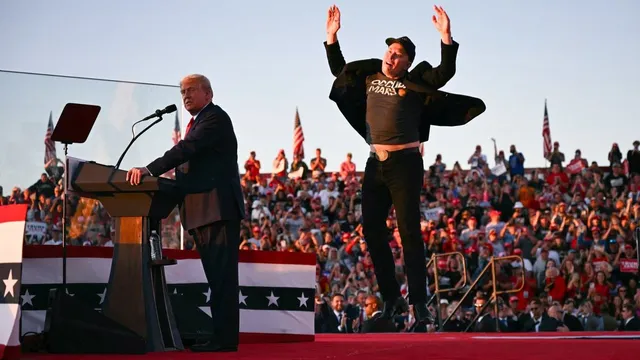- By Ajeet Kumar
- Thu, 29 May 2025 12:53 PM (IST)
- Source:JND
Elon Musk, Tesla boss, has announced his departure from the Trump administration after leading a tumultuous efficiency drive. His "off-boarding will begin tonight," a White House official told news agency Reuters late Wednesday, confirming Musk's departure from the government. Earlier, Musk on Wednesday took to his social media platform X to thank President Donald Trump for his time as a special government employee with the Department of Government Efficiency draws to an end.
His departure was quick and unceremonious. He did not have a formal conversation with Trump before announcing his exit, according to a Reuters source with knowledge of the matter, who added that his departure was decided "at a senior staff level."
1. Did Elon Musk get kicked out of the Trump Administration?
His decision has triggered multiple questions: whether there was a conflict between the billionaire and the US President or his term ended. While the precise circumstances of his exit were not immediately clear, he left a day after criticising Trump's marquee tax bill, calling it too expensive and a measure that would undermine his work with the US DOGE Service.
However, taking to his own platform, X, Musk cited two news articles, where the publisher had explained the meaning of "special government employee" in the United States. According to the rule, a special government employee can serve for 130 days. As he took oath on January 20th this year, technically his tenure of 130 days should end on May 30.
2. Musk: A Right hand of President Trump
While Musk remains close to the president, his exit comes after a gradual, but steady slide in standing. After Trump's inauguration, the billionaire quickly emerged as a powerful force in Trump's orbit: hyper-visible, unapologetically brash and unfettered by traditional norms. At the Conservative Political Action Conference in February, he brandished a red metallic chainsaw to wild cheers. "This is the chainsaw for bureaucracy," he declared. On the campaign trail, Musk had said DOGE would be able to cut at least $2 trillion in federal spending. DOGE currently estimates its efforts have saved $175 billion so far.
Musk, the world's richest person, has defended his role as an unelected official who was granted unprecedented authority by Trump to dismantle parts of the US government. Having spent nearly $300 million to back Trump's presidential campaign and other Republicans last year, he said earlier this month he would substantially cut his political spending. "I think I've done enough," Musk said at an economic forum in Qatar.
3. All was not well between Trump and Musk
The most recent source of friction came on Tuesday when Musk criticised the price tag of Republicans' tax and budget legislation making its way through Congress. "I was disappointed to see the massive spending bill, frankly, which increases the budget deficit, not just decreases it, and undermines the work that the DOGE team is doing," Musk told CBS News. Reuters, quoting its sources, said the billionaire's decision to trash Trump's bill on television deeply upset senior White House aides.
His political activities have drawn protests and some investors have called for him to leave his work as Trump's adviser and more closely manage Tesla, which has seen falls in sales and its stock price.
4. When Musk clashed with Trump's top picks
Musk clashed with three of Trump's most senior cabinet members - Secretary of State Marco Rubio, Transportation Secretary Sean Duffy and Treasury Secretary Scott Bessent. He called Trump's trade adviser Peter Navarro a "moron" and "dumber than a sack of bricks." Navarro dismissed the insults, saying, "I've been called worse." At the same time, Musk began to hint that his time in government would come to a close while expressing frustration at times that he could not more aggressively cut spending.
In an April 22 Tesla conference call, he signalled he would be significantly scaling back his government work to focus on his businesses. "The federal bureaucracy situation is much worse than I realised," Musk told The Washington Post this week. "I thought there were problems, but it sure is an uphill battle trying to improve things in DC, to say the least."
5. Was Musk able to manage Dodge as he promised?
Trump and DOGE have managed to cut nearly 12 per cent, or 2,60,000, of the 2.3 million-strong federal civilian workforce largely through threats of firings, buyouts and early retirement offers, a Reuters review of agency departures found. At the same time, DOGE has hit a number of roadblocks, with federal courts at times propping backup agencies shortly after DOGE had moved to eliminate them. In some cases, staff and funding cuts have led to purchasing bottlenecks, increased costs and a brain drain of scientific and technological talent.
6. Future of Doge
Musk's 130-day mandate as a special government employee in the Trump administration was set to expire around May 30. The administration has said DOGE's efforts to restructure and shrink the federal government will continue. Several cabinet secretaries are already discussing with the White House how to proceed without further alienating Congressional Republicans. But even as department heads will keep some DOGE infrastructure in place, they will likely move to
reassert control over budgets and staffing, sources have told Reuters. "The DOGE mission will only strengthen over time as it becomes a way of life throughout the government," Musk said.
(With inputs from agency)

